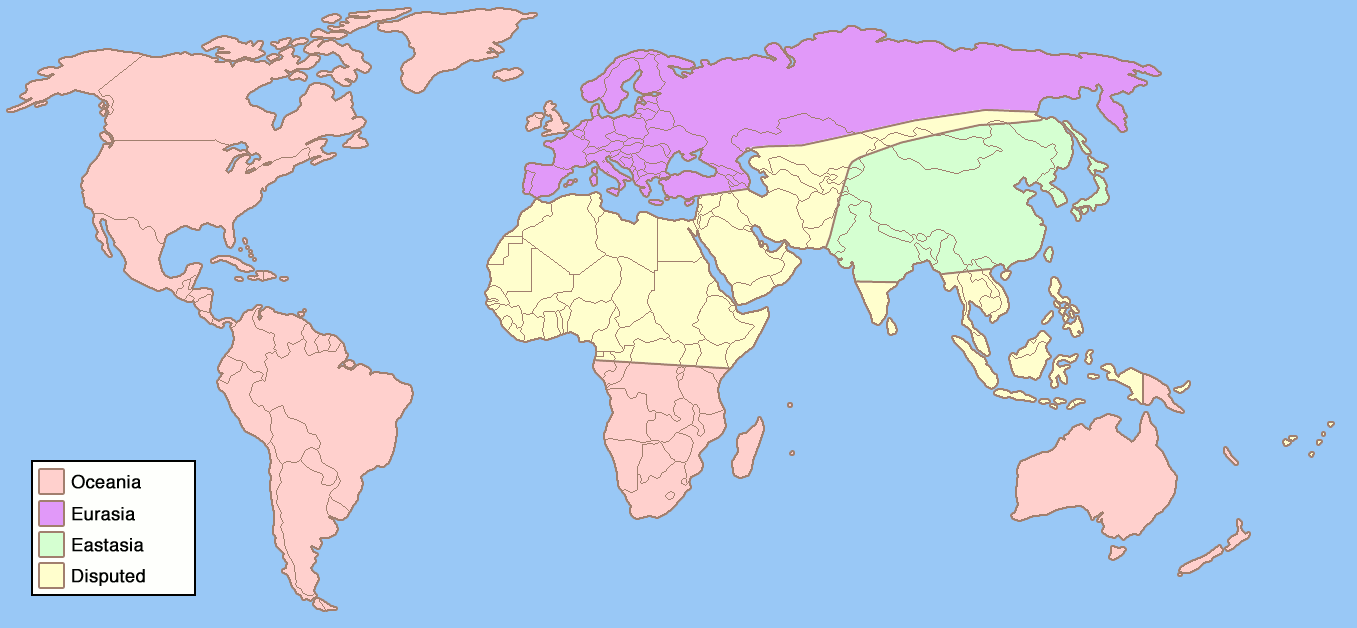 |
| Nineteen Eighty-Four in Esperanto (Tr. Donald Broadribb), 2012 Source: Amazon.in |
But how to present a book as famous as this?! This dystopian classic is already in several lists of "100 best novels" -- from Time and Le Monde, to BBC, and Modern Library. It is the third most frequently borrowed book in the New York Public Library! There are dozens of editions and translations (about 70!) of the novel. To say nothing of the many adaptations in radio, theater, television, film, and comic books. And on this one book there are articles in 93 Wikipedias!
Our strategy was to present first, the author; second, the plot of the novel; third, a bit about the world of 1984 -- the "storyverse"; and fourth, some important themes of the novel to understand its current relevance. |
| Orwell in 1943. Source: Wikipedia |
The 70 (!) or so listeners needed reminding about the plot (alert: including spoilers!) because most of them had read the novel ages ago -- often only during their school years! They only vaguely remembered the contents. Here, for example, is the sad, final paragraph of the novel:
He gazed up at the enormous face. Forty years It had taken him to learn what kind of smile was hidden beneath the dark moustache. O cruel, needless misunderstanding! O stubborn, self-willed exile from the loving breast! Two gin-scented tears trickled down the sides of his nose. But it was all right, everything was all right, the struggle was finished. He had won the victory over himself. He loved Big Brother. (p. 209)
 |
| BIG BROTHER IS WATCHING YOU! From the film 1984 (1984). Source: IMDB |
WAR IS PEACE
FREEDOM IS SLAVERY
IGNORANCE IS STRENGTH
Here's the mind-bending definition of doublethink:
Doublethink means the power of holding two contradictory beliefs in one's mind simultaneously, and accepting both of them.... To tell deliberate lies while genuinely believing in them, to forget any fact that has become inconvenient, and then, when it becomes necessary again, to draw it back from oblivion for just so long as it is needed.... Even in using the word doublethink it is necessary to exercise doublethink. For by using the word one admits that one is tampering with reality; by a fresh act of doublethink one erases this knowledge; and so on indefinitely, with the lie always one leap ahead of the truth. (p. 149)
 |
| Perpetual war: Here are the "superpowers" in 1984. Source: Wikipedia |
- Extreme nationalism - "Two Minutes of Hate" against the current enemy
- Poverty and inequality - "In the long run, a hierarchical society was only possible on a basis of poverty and ignorance." (p. 133)
- Perpetual war - "War is a way of shattering to pieces, or pouring into the stratosphere, or sinking in the depths of the sea, materials which might otherwise be used to make the masses too comfortable, and hence, in the long run, too intelligent." (p. 133)
- Changeable history - "All history was a palimpsest, scraped clean and reinscribed exactly as often as was necessary." (p. 28)
- Surveillance - "There was of course no way of knowing whether you were being watched at any given moment." (p. 2)
- Censorship – “Withers, however, was already an unperson. He did not exist: he had never existed.” (p. 31)
- The future - "If you want a picture of the future, imagine a boot stamping on a human face -- for ever." (p. 188)
We're getting the language into its final shape -- the shape it's going to have when nobody speaks anything else. When we've finished with it, people like you will have to learn it all over again. You think, I dare say, that our chief job is inventing new words. But not a bit of it! We're destroying words -- scores of them, hundreds of them, every day. We're cutting the language down to the bone. The Eleventh Edition won't contain a single word that will become obsolete before the year 2050. (p. 35)
Take "good", for instance. If you have a word like "good", what need is there for a word like "bad"? "Ungood" will do just as well -- better, because it's an exact opposite, which the other is not. Or again, if you want a stronger version of "good", what sense is there in having a whole string of vague useless words like "excellent" and "splendid" and all the rest of them? "Plusgood" covers the meaning, or " doubleplusgood" if you want something stronger still. (p. 35)
In the lively discussion after the talk, a friend pointed out that Newspeak owed as much, in fact, to Basic English -- that simplified, basic form of the English language. Orwell strongly supported Basic English, but was also fully aware of its potential to limit the scope of thought.
As Syme declares darkly, “It is beautiful to destroy words.” (p. 38)
1 comment:
A wonderful article - quite enlightening for a lay reader like me!
Post a Comment